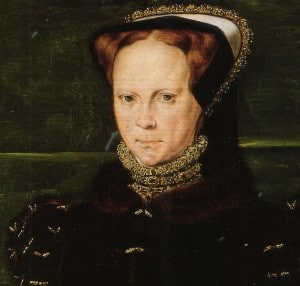 This day in history, 1st October 1553, was a very important day in history because England’s first crowned queen regnant, i.e. a queen ruling in her own right, was crowned at Westminster Abbey.
This day in history, 1st October 1553, was a very important day in history because England’s first crowned queen regnant, i.e. a queen ruling in her own right, was crowned at Westminster Abbey.
Mary I, daughter of Henry VIII and Catherine of Aragon, became England’s first queen and although many people believe that her reign was one of failure and bloodshed, she achieved much in her short reign and I do believe that she paved the way for Elizabeth I.
You can read all about her coronation in my article over at The Elizabeth Files – see “The Coronation of Mary I” – and those of you interested in finding out about the real Mary behind the “Bloody Mary” label may enjoy:-